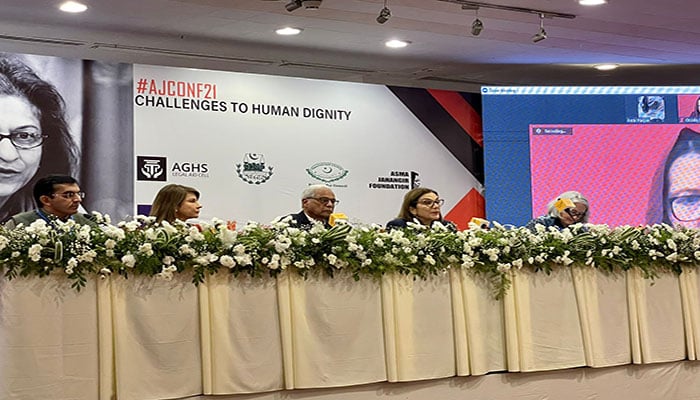Freedom of religion and belief: Minorities facing systematic discrimination, violence, claim speakers
LAHORE: The speakers at Asma Jahangir Conference 2021 claimed that religious and sectarian minorities suffer systematic discrimination and violence in Pakistan.
“Despite all discrimination, we own this land and accept Constitution of Pakistan,” said speakers while attending a session on “Impact of extremism on religious and sectarian Minorities”, under theme of ‘Freedom of Religion and Belief’ on the last day of a two-day Asma Jahangir Conference 2021 at a local hotel on Sunday.
Pervez Hoodbhoy, academic and activist, moderated the session. He said that the Two-Nation Theory and the Objectives Resolution laid basis for the systematic discrimination of minorities in Pakistan. The Christians, Hindus and Parsis, over time, chose to leave Pakistan due to discrimination and violence, he claimed.
Lal Chand Malli, MNA, said that coming from most backward area of Umarkot and Tharparkar, “we (the minorities) own our land and country and we accept the Constitution of Pakistan. “The extremists have their own agenda/ interpretation, but we are torch-bearers of Asma Jahangir,” he added.
The minority MNA said the government, under the Ministry of Human Rights, had formed a parliamentary committee to protect minorities against forced conversions, but the law was blocked at the Council of Islamic Ideology (CII).
Jalila Haider, representative of Hazara community, termed Hazaras “double minority” as they faced systematic discrimination. “The extremists are empowered due to encouragement by the state as Hazaras suffer gross violations of human rights,” she said.
Haris Khaliq, secretary general of Human Rights Commission of Pakistan (HRCP), said that there was confusion from the very outset as to what should Pakistan look like. “The Quaid-e-Azam advocated Pakistan to be an inclusive society for minorities, but at the same time declared it a laboratory of Islam,” he said, adding that it caused a lot of confusion about the ideological roadmap of Pakistan.
Kalpana Devi, Additional Advocate General Sindh High Court, also expressed grave concerns over the state of forced conversions of minorities especially in Sindh. “I am a proud Sindhi,” she said, adding that she belonged to Sindh – the land of Sufis as her forefathers had not migrated. “We love and respect founder of Pakistan as well as founder of Constitution,” she added.
Qamar Suleman said that it was government’s obligation to provide security to its citizens and minorities just like it was government’s responsibility to provide health and education to masses. He urged civil society to unite and fight for the rights and play positive role in development of society. Kalyan Singh Kalyan, Assistant Professor at GCU, was also one of the speakers at the session.
-
 World Economic Forum CEO Borge Brende Steps Down Following Jeffrey Epstein Ties Controversy
World Economic Forum CEO Borge Brende Steps Down Following Jeffrey Epstein Ties Controversy -
 Prince Harry's Ex Chelsy Davy Makes Special Announcement
Prince Harry's Ex Chelsy Davy Makes Special Announcement -
 Dominic Evans Speaks Out After Being Accused Of Being Involved In Nancy Guthrie Kidnapping
Dominic Evans Speaks Out After Being Accused Of Being Involved In Nancy Guthrie Kidnapping -
 AI Doomsday By 2028? New Study Warns Of Global Social, Economic Disruption & ‘ Intelligence Crisis’
AI Doomsday By 2028? New Study Warns Of Global Social, Economic Disruption & ‘ Intelligence Crisis’ -
 Do Sophie And Benedict Bridgerton Get Married As Netflix Show Returns For Season 4 Part 2?
Do Sophie And Benedict Bridgerton Get Married As Netflix Show Returns For Season 4 Part 2? -
 Prince William Reveals He's 'a Little Biased' Toward One Hollywood Star
Prince William Reveals He's 'a Little Biased' Toward One Hollywood Star -
 Meghan Markle, Prince Harry Visit Special Charity On Final Day Of Jordan Trip
Meghan Markle, Prince Harry Visit Special Charity On Final Day Of Jordan Trip -
 Natalie Dormer's Reaction To Sarah Ferguson's Epstein Links Resurfaces After 'The Lady' Release
Natalie Dormer's Reaction To Sarah Ferguson's Epstein Links Resurfaces After 'The Lady' Release -
 Did You Know Famous Windows 10 Background Was Shot In Real Life? Here's Story
Did You Know Famous Windows 10 Background Was Shot In Real Life? Here's Story -
 Pete Davidson's Baby Mommy Elsie Hewitt Reveals Why She 'hated' Being Pregnant
Pete Davidson's Baby Mommy Elsie Hewitt Reveals Why She 'hated' Being Pregnant -
 Harry, Meghan Show Royal Family How To Make Impact Without Public Money
Harry, Meghan Show Royal Family How To Make Impact Without Public Money -
 Hillary Clinton Set For Deposition Before House Committee Today In Jeffrey Epstein Investigation Case
Hillary Clinton Set For Deposition Before House Committee Today In Jeffrey Epstein Investigation Case -
 Samsung Galaxy S26 Ultra Debutes With Display That Blocks Side Viewers
Samsung Galaxy S26 Ultra Debutes With Display That Blocks Side Viewers -
 Fans In Shock As 'Smiling Friends' Creators End Cult-favourite Sitcom On Adult Swim: 'They Did It On Purpose'
Fans In Shock As 'Smiling Friends' Creators End Cult-favourite Sitcom On Adult Swim: 'They Did It On Purpose' -
 Meghan Markle Accused Of Mimicking Kate’s Iconic Style On 'pseudo Royal Tour'
Meghan Markle Accused Of Mimicking Kate’s Iconic Style On 'pseudo Royal Tour' -
 Social Media Addiction ‘like Smoking’: Mumsnet Calls For Under-16s Ban With Cigarette-style Warnings
Social Media Addiction ‘like Smoking’: Mumsnet Calls For Under-16s Ban With Cigarette-style Warnings




